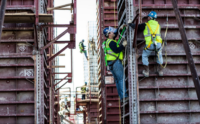The Independence Day holiday had to have been especially jubilant at Chicago Bridge & Iron.
A June 28 court decision on an appeal to the Delaware Supreme Court electrified investors in the company’s stock (NYSE: CBI), boosting the price from $12.91 to $23.08 before falling below $20 on June 30. The overall gain stuck short sellers with sizable paper losses. Previously, some investors believed the company, based in The Woodlands, Texas, was headed for big financial trouble.
The three-judge panel’s written decision offers a fresh perspective on CB&I’s conflict with prime contractor Westinghouse over the disastrous pair of nuclear power projects in South Carolina and Georgia.
In effect, CB&I in a 2015 sale handed its money-losing contracts for those projects back to Westinghouse, a transaction valued at zero. Then last year Westinghouse decided to try to collect $2 billion from CB&I under a true-up, or a post-closing adjustment, to the purchase price.
In effect, CB&I in a 2015 sale handed its money-losing contracts for those projects back to Westinghouse, a transaction valued at zero. Then last year Westinghouse decided to try to collect $2 billion from CB&I under a true-up, or a post-closing adjustment, to the purchase price.
Under the 2015 sale deal, disagreements about the true-up were subject to an audit.
“A massive victory for CB&I,” Thomas Claps, an analyst at Susquehanna Financial, said in a research note quoted by Bloomberg.
Philip Asherman, the departing chief executive of CB&I, had told investors earlier this year that the company’s prospects were sunny and that CB&I’s conflict with Westinghouse would be "decided by lawyers” some time during the year. The court decision confirms Asherman’s optimism perhaps more than he could have hoped.
"We are very pleased," Asherman said in a statement.
The decision sharply limited the scope of the true-up to CB&I’s sale of its Stone & Webster unit back to Westinghouse. CB&I continued working on the projects, but provided service with no further cost risk.
Credit Suisse, which has followed the matter closely, said in a report that “the Court’s decision effectively wipes out the vast majority of Westinghouse’s $2.15B claim,” instead only permitting an independent auditor to focus on $70M of addressable working capital items that occurred between signing and closing.
The June 28 decision reverses a lower court decision made in December.
The deal between Westinghouse and CB&I resolved tensions and litigation as the nuclear construction projects, the first ever using Westinghouse AP1000 reactor designs, fell further behind schedule and hundreds of millions over budget.
To resolve matters, the two companies made the unusual agreement with a purchase price of zero.
The judges noted that the Yiddish term for nothing, or very little, is " bupkis," and that sounds like the name "of an iconic linebacker" who once played for the Chicago Bears football team, "Perhaps appropriately given Chicago Bridge’s Chicago connection."
The Chancery Court, the judges wrote of the trial court on a more serious note, failed to take account of the broad agreement in allowing Westinghouse to challenge the financial accounting used for the CB&I unit.
Challenge to CB&I Accounting Procedures
The trial court had interpreted the true-up in the purchase agreement as allowing Westinghouse to challenge the historical accounting practices used in the CB&I Stone & Webster unit. The deal had set the unit’s net working capital at $1.174 billion, referred to as the target net working capital. The deal also stated that CB&I might receive payments if the projects met milestones for completion.
In any case, given the problems, the transaction's price was going to be zero or CB&I was going to owe money to Westinghouse.
“Chicago Bridge would not be walking away from the deal with a check in hand constituting anything one could call sale profits in the colloquial sense of that term,” the Supreme Court judges wrote in the appeal decision.
Westinghouse’s own chief executive [who has since resigned], described the transaction as a “quitclaim,” allowing CB&I to, in the judges’ words, “walk away and not worry about the projects.”
Any disputes over the true-up, the appeals court judges wrote, would go before an independent auditor, “as an expert and not as an arbitrator,” who would issue a “brief written statement” in an expedited time frame of 30 days.
And a provision of the deal also indemnified CB&I over many matters related to the Stone & Webster unit.
The appeals court judges noted that Westinghouse, which is owned by Japanese giant Toshiba, failed in the deal closing to object to the accounting practices used for CB&I Stone & Webster. CB&I, the judges noted, booked as assets certain large claims against Westinghouse for the cost overruns on the nuclear projects.
All was known to Westinghouse, since it was the target of those claims.
“Westinghouse now argues that those claims were not accounted for in Stone’s financial statements in accordance with GAAP,” they wrote, referencing generally accepted accounting principles. “…Although Westinghouse says it believed that to be true before closing, Westinghouse, which had the right to refuse to close if Chicago Bridge had breached its representations and warranties, chose to close anyway.”
Impasse Led CB&I to Sue Westinghouse
When the companies reached an impasse over the true-up, CB&I sued Westinghouse and won a decision in Delaware’s Court of Chancery last December.
That trial court’s error, the Supreme Court judges now wrote, “rendered meaningless the Purchase Agreement’s Liability Bar.”
The next step in the case, according to Credit Suisse, is another hearing in Delaware Chancery Court on terms outlined by the appeal decision. And then the independent auditor is supposed to do its work.






Post a comment to this article
Report Abusive Comment